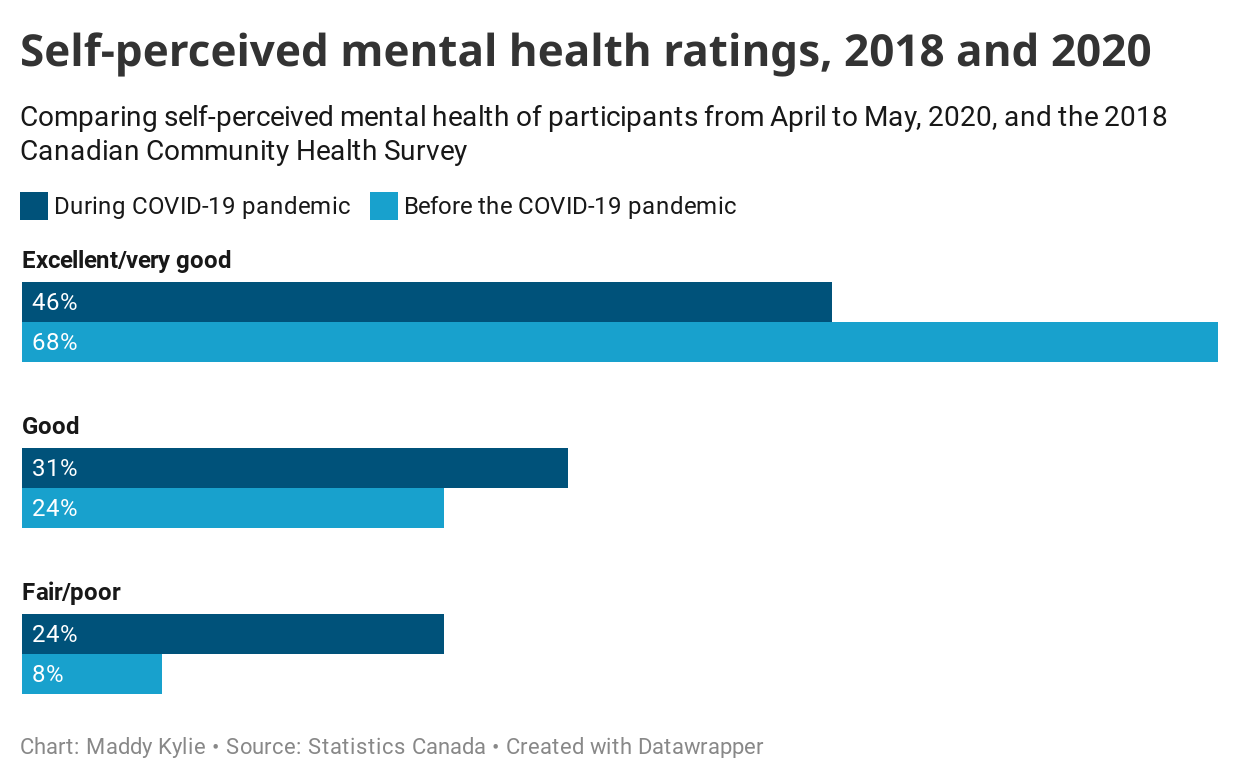With the holidays fast approaching, mental-health experts fear a season that can be stressful enough in normal years will be much more so with the COVID-19 pandemic still raging.
Although the holidays are traditionally seen a joyous occasion, a 2018 study found that a quarter of Canadians find them emotionally overwhelming.
According to a Statistics Canada survey, the mental health of Canadians has suffered since the COVID-19 outbreak. In that survey the percentage of respondents who rated their mental health as fair or poor more than tripled in the spring, 2020 as compared with 2018. At the same time, the percentage of respondents who rated their mental health as good or excellent dropped.
Dr. Tim Simboli, the executive director of the Canadian Mental Health Association (CMHA) said it's hard to tell exactly how much mental-health challenges have increased amid the pandemic, but he says they “certainly have.”
“It's hard to put a quantum on it, but it's definitely going up,” he said.
“Suicidality is supposedly up by anywhere from six to 10 per cent. Self-harm is up noticeably and substance abuse is up quite a bit too.”
“This is so pervasive, there are not many people who are unaffected by this pandemic,” Simboli added.
And the holidays may just add to this already stressful time.
“Everyone is trying not to get it and trying not to pass it on and that makes Christmas that much harder," said Simboli.

Around this time of year there is also less sunlight, which can cause Seasonal Affective Disorder (SAD), he said.
This decrease in sunlight may disrupt people's internal clock and lead to feelings of depression.
Several factors play into making the holiday season a difficult one.
Isolation and uncertainty
“The holidays usually involve lots of social time, lots of family time and for more and more people that's just not going to be possible,” said Simboli.
For Erin Bellwood, 37, bringing the family together for Christmas celebrations may not be possible this year.
“I think the uncertainty and the unknowing is playing into people’s mental health,” she said. “People are already stressed out financially and mentally, so trying to deliver a Christmas that feels normal is almost impossible this year.”
Bellwood says she will likely be able to self-isolate and visit her parents for the holidays, but her plans are not yet certain. As for her sister and nephews, there may be too many cases in their area for them to safely visit. [WHERE ARE THESE FOLKS LOCATED?]
“The hardest part is not knowing what you can and can’t do,” she said. “I think that’s going to be a lot for people to deal with this year.”
Psychotherapist Frances Fitzgibbon says adjusting to a COVID-era holiday season can be painful.
“For those that rely on seeing others around the holidays and are living in lockdown areas, this can be fear-inducing as they can see themselves ‘alone on Christmas’ … it brings on feelings of disconnection and isolation,” she said.
Making room for new traditions
Despite additional stressors due to the pandemic, there may still be ways Canadians can stay positive this holiday season.
Simboli urges people to keep their expectations in check. Since people won't be able to celebrate the way they normally would, having an open mind is vital, he says.
Similarly, Fitzgibbon recommends “re-conceptualizing the holidays” by trying something different this year.
She says starting a new tradition, such as using video equipment for socially distanced parties and events, is a safe way to stay connected with friends and family.
“We are living through a piece of history, so if we reconceptualize our holiday time to do something new or different, rather than the mindset of 'I can't do what I've always done', it can be comforting and even exciting,” said Fitzgibbon.




